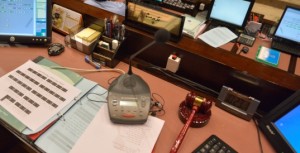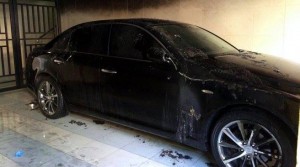The international community has expressed alarm over the Maldives’ sudden suspension of the second round of presidential elections, initially scheduled for September 28.
The Supreme Court issued an interim order on Monday evening, signed by four of the seven-member bench, halting the election until the court rules on allegations of electoral impropriety filed by third-placed presidential candidate, Gasim Ibrahim.
Gasim is seeking annulment of the first round in which he received 24.07 percent of the vote, alleging that he received at least 20,000 more votes and declaring that “God Willing, Gasim will be President on November 11″.
The Elections Commission has dismissed the credibility of evidence submitted to the court, mostly speculation by anonymised witnesses, and noted that even if factual the claims were insufficient to impact the results of the first round. It has also pointed to unanimous positive assessments of the polling by international election observers.
The case is continuing today after the EC’s lawyer, former Attorney General Husnu Suood, was yesterday thrown out for ‘contempt of court’. Suood had argued that the injunction violated Article 111 of the constitution requiring a second round to be held a maximum of 21 days after the first.
India
India, whose observers monitored a third of the ballot boxes across the country, called upon all concerned in the Maldives “to address the current situation at the earliest so that the electoral process could be resumed in a manner that respects the will of the Maldivian people.”
“It is important that the second round of the Presidential elections is held as scheduled and the candidate elected by the people of Maldives assumes the Presidency on 11 November 2013 as mandated by the Constitution,” stated the spokesperson for India’s Ministry of External Affairs.
“India has consistently conveyed its support for the democratic process in Maldives. It was in this regard that India had called for free, fair and credible Presidential elections in meeting the aspirations of the people of Maldives. The first round of Presidential elections was held on 7 September 2013 in a transparent, organised and peaceful manner. This was acknowledged by domestic and international observers, including those from India,” the spokesperson stated.
“We have seen recent reports that the Supreme Court of Maldives has postponed the second round of Presidential elections scheduled to be held on 28 September 2013. This development has resulted in uncertainty concerning the second round, which may have an impact on peace, stability and security in the country,” the spokesperson noted.
United Kingdom
UK Foreign Office Minister Alistair Burt said the country was “extremely concerned” at the Supreme Court’s decision to delay the second round of presidential elections.
“I recognise the right of the Maldivian courts to ensure legitimate allegations of electoral malpractice are investigated appropriately. However, it is vital to avoid any unnecessary disruptions to the national electoral process, and for representatives from all sides to be represented during any legal proceedings,” Burt stated.
“In light of the widely held judgment of both international and domestic observers that elections were free and fair, I hope that the second round of elections will go ahead without further delay. It is especially important that the second round of elections is held within the timescales specified in the Maldives constitution,” he added.
Canada
Canadian Minister of Foreign Affairs John Baird said Canada was “very concerned” over the delay in the run-off election, and indicated that it would push the Commonwealth’s human rights and democracy arm to put the matter on its agenda..
“International election observers, including from the Commonwealth, as well as domestic election observers, all viewed the September 7 election as free and fair. This delay is troublesome and can only lead to more instability,” said Baird.
“We call on the people of the Maldives to work together in a calm and democratic fashion and on judicial authorities to not unduly delay the expression by Maldivians of their democratic will. We believe that the Commonwealth Ministerial Action Group should discuss this issue at its Friday meeting in New York City,” he added.
United Nations
UN Secretary General Bai Ki-moon said he was concerned about the Supreme Court’s decision ordering the postponement of the second round, given that the first round was “widely recognised as a success by international and domestic election observers.”
“It is of the utmost importance that the will of the people be respected in deciding the future of the country. These are pivotal elections for reaffirming the democratic process in the Maldives,” read a statement from the UN Secretary General.
“The people of the Maldives have exhibited great patience and should have the opportunity, without undue delay, to exercise their vote. The Secretary-General urges all Maldivians to exercise restraint, renew their commitment to the Constitutions and work toward conducive conditions for peaceful, credible run-off polls to take place as soon as possible.”
European Union
The European Union has noted the temporary injunction issued by the court, but also recalled that the international community recognised the outcome of the first round as inclusive and credible, and considered that it reflected the will of the Maldivian people.”
“I call upon the responsible Maldivian authorities to ensure that the second round takes place without delay and in accordance with the constitution of the Maldives. I urge all Maldivians to work together to safeguard the integrity of the democratic process and ensure that the second round takes place in the same impartial and effective spirit as the first,” stated EU High Representative Catherine Ashton.
Australia
The Australian government said it had noted court’s postponement of the second round of presidential elections, despite the “positive findings of international observers, including the Commonwealth Observer Group, on the conduct of the recent first round”.
“These elections are an important step in entrenching democracy following the disputed transfer of power there in February 2012,” read a statement from the Australian High Commission in Colombo, Sri Lanka.
“Australia hopes to see an early resumption of the electoral process, with the second round of elections conducted in a manner that is free, fair and transparent, in accordance with the rule of law, and gives free expression to the will of the people of the Maldives,” the statement read.
“We call on all parties to maintain calm and order and to work together peacefully and cooperatively while this situation is considered by the Supreme Court. It is important that the results of the democratic process are respected.
“The international community will continue to watch developments in the Maldives very closely.”
United States
US Ambassador Michele J Sison visited Male on September 24-25 where she “urged Maldivian officials and political party leaders to resolve the issue of elections promptly.”
“International and domestic observers, including US government officials, all characterised the first round of Maldivian presidential elections as free and fair. The high turnout reflects the Maldivian people’s desire to elect democratically their own representatives,” read the US statement (also in Dhivehi).
“Holding the second round of elections in a timely fashion – as mandated by the Maldivian constitution – is central to the democratic process and a peaceful transition of power that reflects the will of the Maldivian people,” the statement read.
At the same time, the US Embassy in Colombo issued an alert to US citizens travelling in the Maldives recommending that they “exercise caution, avoid large crowds and monitor media coverage of local events.”
Commonwealth
Commonwealth Special Envoy to the Maldives Sir Donald McKinnon said it was “deeply worrying to hear comments calling for the annulment of [the] election. No election anywhere is going to be absolutely perfect and there was no evidence or claim before the election that the voter register was manifestly so deficient as to so distort the outcome.”
He called for the Supreme Court to “deliver its judgment expeditiously in the case pending before it so that the second round can be held, and the verdict of the Maldivian people determined, without further delay.”
“The people of Maldives went to the polls in good faith on 7 September to elect a president. That election was found by national and international observers, notably by a high-level and experienced Commonwealth Observer Group, to be competitive and credible,” McKinnon said.
“As I have stated before, the Maldivian people must be the winners in this election – they are collectively more important than any one political leader. The people of Maldives worked hard to get a democratic constitution, they want it respected and it is their right that the elections deliver a result that reflects the wishes of the majority.”
Read the Commonwealth statement
Maldivian government condemns “irresponsible statements”
President Mohamed Waheed Hassan, who received 5.13 percent in the first round of presidential elections, has lashed out at “irresponsible statements by foreign governments and international organisations” which he declared are “not be helpful in consolidating democracy in the country.”
“Our statutory institutions, including the judiciary, have shown that they are capable of making sound and impartial decisions on some of the most complex issues of national importance,” read a statement from Waheed on the President’s Office website.
The comments appeared at odds with a report from UN Special Rapporteur for the Independence of Judges and Lawyers, Gabriela Knaul, who in May 2013 presented a detailed report documenting a judicial system in crisis to the UN General Assembly.
The Special Rapporteur wrote that she was “concerned that the Supreme Court is perceived as not following due process in many of its decisions. It is also troublesome that some of the Supreme Court’s interventions are perceived as arbitrary and as serving the judges’ own personal interests.”
President Waheed meanwhile called “on foreign governments, the UN, and the Commonwealth to show responsibility and to refrain from issuing statements commenting on, and speculating about, the on-going court case.”
“Local and international observers did a commendable job in observing the elections. Yet, they do not decide on the cases filed by one or more candidates in an election. It is never done anywhere in the world,” Waheed stated.
Read President Waheed’s statement

